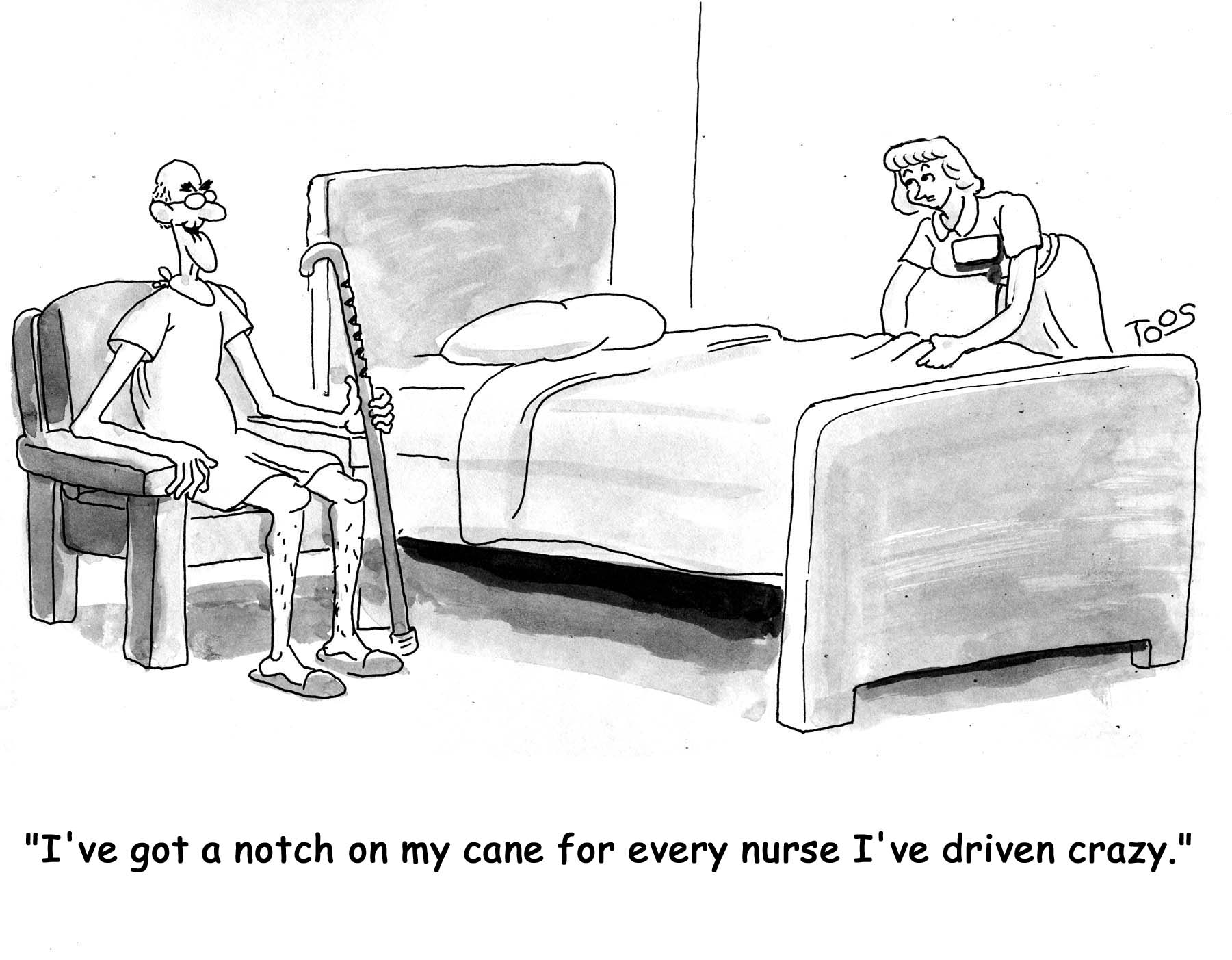Roto-Rooter & Recovery: Part 2
 Thu, February 9, 2012 at 6:40AM
Thu, February 9, 2012 at 6:40AM Continued from Part I…
So, I had survived after all. They’d performed the TURP while I was under anesthesia, and now, here I was. I could scarcely grasp the fact that the surgery was completed and I was actually in the recovery room. (These drugs: wow.) The nurses confirmed, at least a couple of times, in response to my continued expressions of disbelief, that yes, the surgery was over. I eventually developed an awareness that I felt pretty loopy but in no particular pain. Then someone called over from across the room, “Mr. Arnold, Katrina called.”
Ahhh…yes. Thank you very much! (Somebody called! Katrina called!)
And, then, I even took a phone call. In my first moments of consciousness, in typical TechnoMonk fashion I suppose, I had grabbed my bag and found my iPhone. Mere minutes later the phone started vibrating, so I answered it. The doctor’s office was on the line to reschedule the time of my first post-op appointment. Amazingly, I had the presence of mind to know what was going on; the new appointment time was there on my calendar later when I checked it.
 As time passed, the anesthesia, of course, began to wear off and I became more and more uncomfortable. I took the Vicodin that was offered, thankful that narcotics were available to ease my distress. Unfortunately, my body would not tolerate this painkiller. So, after the first 24 hours, I had no pain medication at all. My second day in the hospital was spent trying to reverse the effects (mostly intense stomach pain) of the Vicodin; it had actually caused more problems than it solved. I did experience some pain relief, during the first day and a half, with an occasional opium suppository. At one point I remember saying to the nurse, “I can’t believe I’m asking this, but could we do another one of those suppository things?” (I didn’t find out until later, though, that it was an opiate. Taking this approach to pain relief had its own consequences: I had a terrible rash on my butt for about the first 7 days after getting out of the hospital.)
As time passed, the anesthesia, of course, began to wear off and I became more and more uncomfortable. I took the Vicodin that was offered, thankful that narcotics were available to ease my distress. Unfortunately, my body would not tolerate this painkiller. So, after the first 24 hours, I had no pain medication at all. My second day in the hospital was spent trying to reverse the effects (mostly intense stomach pain) of the Vicodin; it had actually caused more problems than it solved. I did experience some pain relief, during the first day and a half, with an occasional opium suppository. At one point I remember saying to the nurse, “I can’t believe I’m asking this, but could we do another one of those suppository things?” (I didn’t find out until later, though, that it was an opiate. Taking this approach to pain relief had its own consequences: I had a terrible rash on my butt for about the first 7 days after getting out of the hospital.)
I awoke from the procedure with a catheter inside me. Now, that’s challenging enough, of course, but this happened to be a much-larger-than-your-average catheter, inserted right up into that place where there’s really no space.  It was connected to an IV kind of contraption that dripped fluid into me and constantly kept my insides flushed out, carrying away blood from my internal wound. For the next two days, it was my job to lie there patiently while I automatically peed out pink liquid into the bag tethered to the side of my bed. I ended up watching the bag with the source fluid very closely, making sure to call the nurse when it got too low. Everyone seemed entirely delighted by the color of the liquid that I passed – that it was merely pink, not too bloody red. So, of course, I was pleased that they were pleased.
It was connected to an IV kind of contraption that dripped fluid into me and constantly kept my insides flushed out, carrying away blood from my internal wound. For the next two days, it was my job to lie there patiently while I automatically peed out pink liquid into the bag tethered to the side of my bed. I ended up watching the bag with the source fluid very closely, making sure to call the nurse when it got too low. Everyone seemed entirely delighted by the color of the liquid that I passed – that it was merely pink, not too bloody red. So, of course, I was pleased that they were pleased.
The most significant source of stress for me while in the hospital was not actually the pain, though. My major issues had to do with privacy. And, no, not because of the nature of my surgery; I quickly became accustomed to having my gown lifted by anyone and everyone to check on my catheter and/or to insert a suppository up my rear. No problem. The big deal was trying to cope with my roommate(s). The room to which I was first assigned had another patient, in the next bed, who was so totally out of it that when my doctor visited the first evening, he asked that I be moved to a quieter space.
The room I moved to was even more problematic, however, and I spent almost 24 hours dealing with the antics of the new guy. He was in for knee-replacement surgery and obviously in much more pain than me. I don’t know how much of his behavior was drug-related, but the commotion surrounding him became a very big problem. He had a ridiculously loud, obnoxious, cell-phone ring tone, which seemed to go off constantly. And then, when someone wasn’t calling him, he was dialing out.  And he had one of those VERY LOUD TALKER cell phone voices that really intruded into my personal space. On top of all that, he had people needing to check up on him way more frequently than anyone was checking on me. If it wasn’t one thing, it was another.
And he had one of those VERY LOUD TALKER cell phone voices that really intruded into my personal space. On top of all that, he had people needing to check up on him way more frequently than anyone was checking on me. If it wasn’t one thing, it was another.
He even had an occupational therapist stop by to inform him that he was now going to need to put his pants on one leg at a time. (Did I really hear that correctly?!)
The most disruptive, and entirely outrageous, episode was when he guessed he could reach an item that was on a table close to his bed … but was clearly out of range. He kept reaching and stretching, stretching and reaching (when he should have been pressing the call button to ask for help), until he finally fell out of his bed. Yes, there he was, an old fart ten years my senior, needing to be totally immobilized because he was healing a new knee, and he literally took a nosedive off his bed. I said something like, “WTF, dude. What were you thinking?!” (… as he’s writhing in agony on the floor …) I pushed my button, and when they entered the room, the reason for the call was obvious. It took about 4 or 5 of them, as I recall, to lift him back onto his bed. Miraculously, he seemed to not have done any real damage to himself. But, oh my god, was this a noisy, upsetting, scene.
[The story continues here.]
[Technorati Claim: 3T2RHNHG8ZS9]
Marking A Monk’s Milestone
 Sat, February 4, 2012 at 1:21PM
Sat, February 4, 2012 at 1:21PM  This is the 300th entry for this blog, so I thought I’d take a moment to reflect on my journey here.
This is the 300th entry for this blog, so I thought I’d take a moment to reflect on my journey here.
I started writing TechnoMonk’s Musings in November 2005. The first platform I used was Blogger.com, a free service provided by Google; back then, I used “TechnoMonk.us” as the blog’s address. In October 2006, I stopped using Blogger and began anew here at TechnoMonksMusings.com, using the Squarespace service.
Although entries have been fairly infrequent for the past couple years, I have, in the last month, given the site a complete facelift and started writing again. I have also, just recently, transferred over most of the content from the 2005-06 era and that now appears here. The old Blogger site has been taken down.
300 posts in 75 months! … even with my noticeable lazy periods, that averages almost one entry per week.
I welcome back my old readers, and look forward to attracting new. I hope you like the revised look, and I sincerely invite you to share your thoughts here, too. Click on the “Post a Comment” link below any entry and tell me what’s on your mind!
 TechnoMonk | in
TechnoMonk | in  Blogging,
Blogging,  Notices,
Notices,  Writing
Writing The End of the World As We Know It
 Thu, February 2, 2012 at 6:38AM
Thu, February 2, 2012 at 6:38AM  One evening last summer I had a guest at my apartment and we were vegging out in the living room watching So You Think You Can Dance (one of my favorite shows). At one point she turned to me and asked, “do you have any sherbet?” I imagine I had a rather shocked look on my face as I replied, “you know I don’t do alcohol anymore.”
One evening last summer I had a guest at my apartment and we were vegging out in the living room watching So You Think You Can Dance (one of my favorite shows). At one point she turned to me and asked, “do you have any sherbet?” I imagine I had a rather shocked look on my face as I replied, “you know I don’t do alcohol anymore.”
Of course, then it was her turn for a totally confused stare.
So, upon reading her nonverbals, I said, “oh, you said sherbet…I was thinking sherry. Sorry. But, still, the answer is no. I really don’t have that kind of dessert stuff around here.”
However, thinking I would try to be an accommodating host, the next time I went to the grocery store I looked for the sherbets in the frozen food case. I didn’t find any. What I did find, though, was a small selection of sorbets. I have since learned that a sorbet is a non-dairy version of the frozen product known as a sherbet (the latter having modest butterfat contents).
I picked out a couple different flavors and took them home so that if I were ever asked that question again, I could say, “well, I have no sherbet, but would you care for some sorbet?”
As it turned out, she only visited once more when the topic came up, and, indeed, we enjoyed small dishes of sorbet together. (She lives out of town and doesn’t often stop by.)
The funny thing is, I have rarely in my life ever indulged in sherbets, sorbets, ice creams, or any kind of frozen desserts … well, except the very infrequent Dairy Queen Blizzard.
But, having been asked that question, and then having sought out those sorbets, I now find myself having become rather hooked. What the heck is going on in this world when I can get addicted to sweet, fruity, frozen water?
The explanation must be: the end is nigh. It’s 2012. I suspect we’re getting close to the end of the world as we know it.
Soundtrack Suggestion
It’s the end of the world as we know it.
It’s the end of the world as we know it.
It’s the end of the world as we know it and I feel fine.
Roto-Rooter & Recovery: Part I
 Sun, January 29, 2012 at 3:01PM
Sun, January 29, 2012 at 3:01PM I had tried valiantly to avoid this operation for at least a decade. Of all the invasive procedures that can happen … I mean, wow. Not that I’d rather have brain surgery, of course, but still … here I was. The wait was over and the dreaded TURP was going to happen. This was the week I was going to show up at the hospital, point to my private parts, and say “have at it.”
 The morning before the surgery, the schedule called for me to go to the hospital and pre-register … which is a smart way to do things. This appointment did exactly what was intended: to save a lot of time during the day of the operation. I answered the receptionist’s and nurse’s questions (verified that I had not been taking blood-thinning drugs, for example), signed their forms, asked my own questions (can I bring my iPhone? my Kindle? my dietary supplements? – yes, yes, yes), and received my hospital wristband (along with the warning not to take it off or I’d have to do the check-in procedure all over again tomorrow). Then, I went to the lab for the final blood work, where I had to be stuck TWO times, by TWO techs, so they could do DUPLICATE tests. Oh, well, better safe than sorry?
The morning before the surgery, the schedule called for me to go to the hospital and pre-register … which is a smart way to do things. This appointment did exactly what was intended: to save a lot of time during the day of the operation. I answered the receptionist’s and nurse’s questions (verified that I had not been taking blood-thinning drugs, for example), signed their forms, asked my own questions (can I bring my iPhone? my Kindle? my dietary supplements? – yes, yes, yes), and received my hospital wristband (along with the warning not to take it off or I’d have to do the check-in procedure all over again tomorrow). Then, I went to the lab for the final blood work, where I had to be stuck TWO times, by TWO techs, so they could do DUPLICATE tests. Oh, well, better safe than sorry?
I did my best to keep breathing the rest of that day. The anesthesiologist called me in the evening for a short chat, and told me a little bit about the approach: we’d be using a spinal anesthetic, a technique that, when combined with the other drugs, would totally put me out, and also provide maximum benefit to the surgeon by relaxing my midsection for the work on my prostate. I wouldn’t remember a thing, he assured me.
That night I slept very fitfully and awoke early. According to instructions, I didn’t eat or drink anything. My ride was going to be here at 6:45 so I could be at the hospital by 7:00. Surgery was scheduled for 7:30.
The rest of the following two-day period (my time in the hospital) is somewhat of a blur. But I do remember parts …
The receptionist downstairs pointed me to the elevator. I went up to the waiting area and they almost immediately called my name. I was shown to a tiny curtained-off area where I was asked to disrobe and put all my belongings into a plastic bag. (Luckily, I had also brought along a gym bag to carry things in.) I put on the hospital garb and lay down. “Could I have another blanket, please?” They brought a nice, pre-warmed one. Ahhhh.
 Somebody came by and inserted an IV into my lower left arm. Poke. Ouch. The nurses were very nice, though business-like. The anesthesiologist came by and introduced himself. My urologist (the surgeon) stopped by to say hello and to let me know that we’d be underway shortly.
Somebody came by and inserted an IV into my lower left arm. Poke. Ouch. The nurses were very nice, though business-like. The anesthesiologist came by and introduced himself. My urologist (the surgeon) stopped by to say hello and to let me know that we’d be underway shortly.
Soon I was rolling down the hallway toward the operating room. We entered, I looked the place over, and said something like: “hmmmm… it doesn’t look like the Grey’s Anatomy rooms.” (I guess things are always different in real life, eh?) The put me on the table and …
… almost immediately I woke up in the recovery room: in the little curtained area where I’d left my stuff. What? It’s over?!? Really?
Well, of course it wasn’t over. The surgery was rather the easy part, even if it did involve inserting a tube up my penis and carving away part of my prostate. (They don’t call it a roto-rooter job for nothing!)
[The story continues here.]
Insurance Rates
 Tue, January 24, 2012 at 8:33PM
Tue, January 24, 2012 at 8:33PM This note is to inform you that I will not be renewing my auto insurance policy with you, effective February 7, 2012.
 The bill I recently received, for my six-month renewal, is $649.70. As I spent some time trying to wrap my head around this number, I did the math and discovered this is exactly 25% more than my previous bill. I did not understand at all how this could possibly be correct, so I called, and you indicated the rate increase was due to the fact that I had had a claim in 2010 and it (the consequences of the accident) had finally caught up with me. (Or words to that effect...)
The bill I recently received, for my six-month renewal, is $649.70. As I spent some time trying to wrap my head around this number, I did the math and discovered this is exactly 25% more than my previous bill. I did not understand at all how this could possibly be correct, so I called, and you indicated the rate increase was due to the fact that I had had a claim in 2010 and it (the consequences of the accident) had finally caught up with me. (Or words to that effect...)